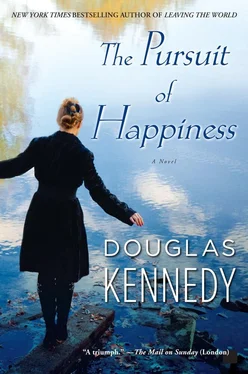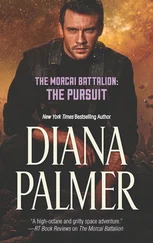'Do you want this money to provide an immediate income for you?' he asked.
'Absolutely not', I said. 'I'm planning to go back to work as soon as possible. I refuse to be the so-called lady of leisure. It's a waste of a life'.
'And if marriage happens again for you?'
'It won't. Ever'.
He thought about that one for a moment, then said, 'Fine. Then let's think very long term'.
His financial plan was a straightforward one. My five thousand dollars in government bonds would be moved into a pension plan that would mature when I was sixty. Twenty thousand dollars would be used to acquire a portfolio of blue-chip stocks - with the aim of achieving at least six per cent growth per annum. The remaining five thousand would be mine to play with - or to live on while I found work.
'All going well, you will have quite a substantial war chest behind you by the time you're into middle age. Add to this the fact that you will be sitting on an appreciable asset - a completely paid-off apartment - and it looks like you will be financially dependent on no one'.
That was what I wanted - complete independence. Never again would I allow myself to be dependent on someone else. I wasn't slamming the door on men, or sex, or the possibility of falling in love. But there was no damn way I was going to stumble into a situation where I would be reliant on a man for my sense of self, my social status, or the cash in my pocket. From now on, I would be an autonomous unit: self-sufficient, unimpeded, unattached.
So I agreed to Lawrence's financial plan. Checks were written, investments made. Though I now had five thousand dollars in my bank account - to spend however I wanted - I forced myself to be prudent, determined not to squander it on frivolities. Because money now meant independence. Or, at least, the illusion of independence.
After sorting out my financial situation, I paid a call to Saturday Night/Sunday Morning. Nathaniel Hunter's appalling successor had only lasted a few months in the job. She'd been replaced by a tiny, impish woman named Imogen Woods - a real Dorothy Parker type who was known for her long lunches, her perpetual hangovers, and her spot-on taste in fiction. When I called her office, she told me to drop by the next afternoon around five. She was sitting in an armchair next to her desk, correcting some proof pages from the magazine. A Pall Mall was smoldering in an already brimming ashtray. A highball was in one hand, a pencil in the other. She had a pair of half-moon glasses on the end of her nose, through which she studied me with care.
'So - another refugee from married life', she said.
'News obviously travels fast'.
'Hey - it's a magazine. Which, in turn, means it's filled with people who think they're doing something important, but secretly know they're doing nothing of importance, and therefore like nothing better than gossiping about other people's more interesting lives'.
'My life isn't particularly interesting'.
'A marriage that only lasts five months is always interesting. The shortest of my three marital disasters lasted six months'.
'And the longest?'
'A year and a half'.
'Impressive'.
She cackled loudly, exhaling a lungful of smoke. 'Yeah - like hell. So, tell me - when are you going to write another story for us? I dug your first one out of the file. Pretty damn good. Where's the next one?'
I explained that I considered myself a one-hit wonder - that I had tried writing fiction again, but found that I had nothing to say.
'So that's really going to be your only story?' she asked.
'I think so, yes'.
'He must have been quite a guy, your sailor'.
'He was fictitious'.
She threw back her highball.
'Yeah - and I'm Rita Hayworth. Anyway, I'm not going to pry, much as I'd like to. How can I help?'
'I know my old job is filled, but I was wondering if I might be able to do a little freelance reading for you...'
'No problem', she said. 'Ever since the goddamn war ended, everyone in America's decided they're a writer. We're deluged with unsolicited crap. So we'd be happy to throw around twenty manuscripts your way each week. We pay three bucks a report. It ain't a fortune, but it should pay for some groceries. Your friend Emily Flouton was telling me that you've just moved into your own place'.
'That's right', I said.
'So tell me about it', she said.
I did as instructed, explaining a bit about how I threw myself into apartment hunting after leaving George, how I'd found this place on West 77th Street, and had stripped the apartment bare, redecorating it in neutral tones.
'That'll work', she said.
'What will work?'
'Your story about the apartment. We'll call it "Act Two" or "Starting Over" or something goddamn similar. What I want from you is a smart, funny account of finding your own place after your marriage got torpedoed'.
'But, like I told you, I'm not writing fiction anymore'.
'And I'm not asking you to write fiction. I'm asking you to be the first contributor to a new slot His Godship the Editor has asked me to develop. He wants to call it "Slice of Life" - which shows you the sort of imagination he's got. But that's the gist of it - a quick, elegant dispatch from that battlefront called "real life". A thousand words, no more, the fee is forty bucks, and to make sure you don't spend too much time sweating over it, I'm going to expect it on my desk five days from now. That's start of business Monday. Are you clear on that, Smythe?'
I gulped. Loudly. 'Are you sure you want me to write this?' I said.
'No - I always waste my time commissioning stuff I really don't want. Come on, Smythe: are you going to do this or what?'
After a nervous pause, I said, 'Yes - I'll do it'.
'That's settled then. Meanwhile, I'll have one of my lackeys dig out twenty new arrivals from the slush pile of The Great Unsolicited Short Story and have them sent over to your place. But do your own story first. And Monday means Monday. Okay?'
'I'll do my best'.
'No - you'll do it very well. Because that's what I'm expecting from you. One final thing - write sharp. I like sharp. Sharp always works'.
Naturally enough, by ten that Sunday night, I had given up hope of making the deadline the next morning. The area around my desk looked like a do-it-yourself snowfall, as it was knee-deep in balled-up typing paper. I was blocked, congealed, mentally barricaded. Over the previous four days, I had tried dozens of different openings to the piece. Each time, I had thrown my hands up in despair, ripped the paper from my Remington, and cursed myself for accepting this commission. I wasn't a writer - I was a fraud. Someone who'd gotten lucky the first time around, but had been a muse-free zone since then. Worse yet, I knew full well that inspiration only constituted around fifteen per cent of the ingredients needed for writing. Craft, diligence, and sheer obstinacy made up the rest of the equation - and I was certainly lacking in all these departments. Because if I didn't possess the stubbornness - and self-assurance - required to toss off a dumb thousand-word feature about redecorating my new apartment, then how would I ever do this sort of thing professionally?
I now knew the answer to that question: I didn't have the skill, the rigor, the sheer moxie required to get on with the job of writing. I didn't trust myself enough.
Just before midnight, I picked up the phone and called Eric, repeating this self-pitying rant to him. I ended with the plaintive comment: 'I suppose I can always stick to editing'.
'What a tragic denouement', he said, with more than a hint of irony.
'I knew I could count on you for sympathy and understanding'.
'I simply don't understand why you can't just write the damn thing - and get it over with'.
Читать дальше












